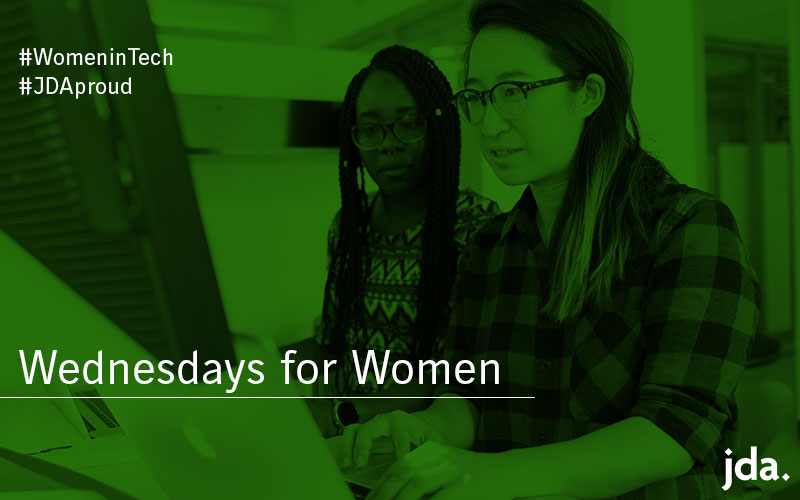October is breast cancer awareness month. Stephanie Vollbrechtshausen, associate business consultant at JDA, shares her thoughts on keeping your emotional wellbeing in check amid the fast-paced world we live in, for this week’s Wednesdays for Women blog.
 With an incidence of 46.3 cases per 100,000 people and mortality rate of 30% for every two million cases you might be familiar with breast cancer but what do you really know about it? According to the World Cancer Research Foundation, breast cancer is the second most common cancer overall, impacting both women and men. For instance, you may be aware that 1 in 4 women are diagnosed with breast cancer worldwide but are you also aware that 1 in 1,000 men are also diagnosed with it?[1]
With an incidence of 46.3 cases per 100,000 people and mortality rate of 30% for every two million cases you might be familiar with breast cancer but what do you really know about it? According to the World Cancer Research Foundation, breast cancer is the second most common cancer overall, impacting both women and men. For instance, you may be aware that 1 in 4 women are diagnosed with breast cancer worldwide but are you also aware that 1 in 1,000 men are also diagnosed with it?[1]
With October being recognized as Breast Cancer Awareness Month worldwide, it is a good time for us to learn more about this illness. Creating awareness fosters knowledge of detection and prevention and greater understanding of the journey of those it has touched. Today, I’d like to focus on one specific area of impact: emotional wellbeing.
Breast cancer incidence varies from country to country, but a pattern is found when analyzing the incidence of such disease by country and lifestyles. What can be inferred from this? According to World Cancer Research Fund, women in highly developed metropolises have a higher incidence of developing breast cancer.[2] Where does this come from? Since the 1940’s women have actively participated in the workplace, becoming independent and aiming to attain the equality that we all deserve. I believe that women’s participation in society and professionally has been fundamental in addressing the drive we all have to be empowered and respected in society and the workplace.
As a vast majority of us have experienced, it can be stressful striving to build a successful career while maintaining a balanced personal life. Could there be a direct correlation between this, and higher incidences of cancer in more developed countries?
Numerous studies, such as one carried out by the College University of London in collaboration with the University of Sydney and Edinburgh, show that there is a strong relation between emotional wellbeing and cancer.[3] The study presents a simple but fundamental principle; mental distress shown as emotional distress is proportionally correlated to distress to the immune system.
I believe emotional and mental wellness get too little of our attention when it is important to include it as a daily habit. Amidst this fast-paced world we live in, external pressures put our emotional health at risk. So, what can we do about it? Here are some suggestions:
- Find time to create the habit of meditation, to create self-awareness about what’s going on in your mind, body and soul.
- Seek for help or advice if you need it, either with a friend or, family or via professional advice. It’s important to talk about it.
- Practice a sport or exercise, as dopamine not only serves as a positive mood changer but working out also strengthens the immune system.
Shifting the focus onto ourselves and finding a way to practice emotional and mental wellness through self-care, may not only help diminish the chances of developing breast cancer and other cancers, but it can also help to make us more productive in the workplace and beyond. These are just a few ideas that I found worth sharing with you, but I would like to learn about yours. What are you doing to relieve stress and make sure you’re at your best?
Finally, if you want to learn more about breast cancer, here are some other resources I highly recommend:
National Breast Cancer Foundation, Inc.
[1] Diet, nutrition, physical activity and breast cancer. (2018). [ebook] World Cancer Research Fund International. Available at: https://www.wcrf.org/sites/default/files/Breast-cancer-report.pdf [Accessed 11 Oct. 2019].
[2] World Cancer Research Fund. (2019). Breast cancer. [online] Available at: https://www.wcrf.org/dietandcancer/breast-cancer [Accessed 12 Oct. 2019].
[3] Batty, G., Russ, T., Stamatakis, E. and Kivimäki, M. (2019). Psychological distress in relation to site specific cancer mortality: pooling of unpublished data from 16 prospective cohort studies. British Medical Journal.

